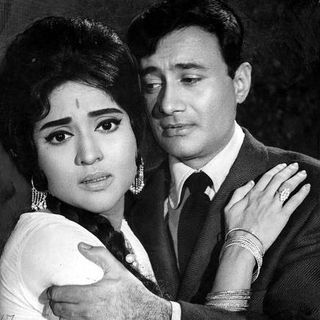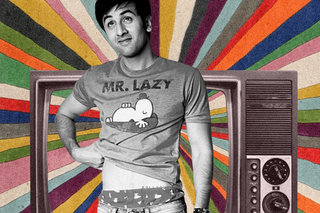
Can We Move On? From The Man‑Child Trope As The Only Counter To Traditional Masculinity
Bollywood offers an unsatisfying alternative to hyper-masculinity: the goofy, utterly confused, dithering man-child.

In Can We Move On, we revisit old tropes and question whether they have any remaining cultural relevance.
To be a desirable man is to either be a street-fighting, girl-stalking, tagline spouting manly man, or it is to be a DSLR-touting, exotic-locale exploring, goofy man-child. At least that’s what mainstream Bollywood cinema over the past decade will tell you.
The goofy, metropolitan guy thrived in cinema by seeming pretty and harmless. Unlike the hypermasculine hero, this man is easier to talk to, shares your interests, shows vulnerability, and isn’t prone to physical violence. As more women shied away from toxic masculinity, they leaned on his shoulder for relief, because he was so sweet and so fun! In Wake Up Sid, Ranbir Kapoor and Konkona Sen Sharma go to the beach, where he takes photos of her smiling at him. In Salaam Namaste, Preity Zinta gets to mock Saif Ali Khan for crying in a film. In Shuddh Desi Romance, Sushant Singh Rajput and Vaani Kapoor take time to loaf around in fairs and play board games together. These men do dates, not stalking. They spend time with you, get to know you, tell you their darkest secrets and consider you an equal. Basically, this man is a great boyfriend!
That is, until conflict occurs. When asked to commit, be responsible, or accept rejection, the man-child dithers and fails, moping and dragging his partner down with him till he deigns to grow up and handle it. The most egregious example of this is Ayan (Ranbir Kapoor) in Ae Dil Hai Mushkil, who simply can’t stand the idea that the love of his life doesn’t love him back. In fact, he only about manages to make his peace with her lack of romantic interest in him when she’s dying of cancer later in the film. In Salaam Namaste, Nikhil (Saif Ali Khan) loves hanging out with his girlfriend, but won’t have her back when she discovers she’s pregnant and wants to keep the baby. Various films like Cocktail, Hum Tum and Shuddh Desi Romance catalogue commitment-phobic heroes putting women through emotional distress while they take agonizing amounts of time to make fairly obvious choices. Like children, these men find themselves unable to handle conflict, choosing escapism, entitlement and a child-like belief in goodwill over taking conflict head-on.
Essentially, the modern man in mainstream Bollywood cinema is an immature man-child. This grown adult archetype universally sucks, as feminist critics observe, with respect to a variety of habits ranging from an inability to clearly communicate commitment to an inability to share the load at home. But, the reel romantic comedy trope only glorifies the man child’s behavior as goofy confusion, and doesn’t tell us what really fuels the same — the large, burgeoning crisis of modern masculine identity.
Related on The Swaddle:
Meat and Masculinity: The Tired Trope That Won’t Go Away
In his book, How to Raise a Boy, psychologist Michael Reichert writes that “Boys’ first disconnection is from themselves.” Young boys rapidly learn that vulnerability is the antithesis of masculinity and learn to not process what they feel. This traditional model was the norm for many fathers and grandfathers, but not for ‘modern’ men, who grew into rapidly shifting cultural norms. Now, men are told they are both free to show vulnerability and not be breadwinners — women technically don’t need them to do either. Yet, decades of cultural conditioning still creates societal expectations of the traditional values those modern men should hold.
“The culture at large is uncertain about what it wants from its men. We give a lot of mixed messages,” Kay Hymowitz, policy researcher and author of Manning Up: How the Rise of Women Has Turned Men into Boys, tells Forbes. “Many women seem to want men that are confident and have a strong sense of themselves. At the same time, they are put off by too much masculine, authoritativeness.”
The most pervasive popular critique of a man-child is his inability to commit and settle down. However, both committing to a woman and settling down to form a family are incidentally some of traditional masculinity’s most important values. This forms a contradiction — men must break away from traditional masculinity to be good men, but also embrace traditional masculinity to be good men. Hymowitz says, “I think a lot of men react to these mixed signals by retreating into themselves, becoming passive and reluctant and often waiting for women to make the first move.”
Because society accepts commitment and monogamy as tenets of a good man, the non-commital man-child’s behavior is seen as a phase they must grow out of. But if all roads lead to traditional masculinity, there is no space for men to create a more honest, vulnerable model for masculinity. To change this, it is important to re-think who really benefits from idealizing commitment and monogamy — the individual or society at large?
The man-child trope will never die, because who doesn’t love a good coming-of-age story? But, it is time their stories flow down a different path — a road that allows them to walk away from convention and stay away from it. The beauty of the modern man is his potential to re-define masculinity. If the man is only a man-child because he doesn’t adhere to commitment and traditional masculine ideas of responsibility, perhaps he simply doesn’t need to, and that’s fine.
Aditi Murti is a culture writer at The Swaddle. Previously, she worked as a freelance journalist focused on gender and cities. Find her on social media @aditimurti.
Related


Tell Me More: Talking Sexual Health Misconceptions and the Politics of Women’s Health With Dr. Tanaya Narendra
